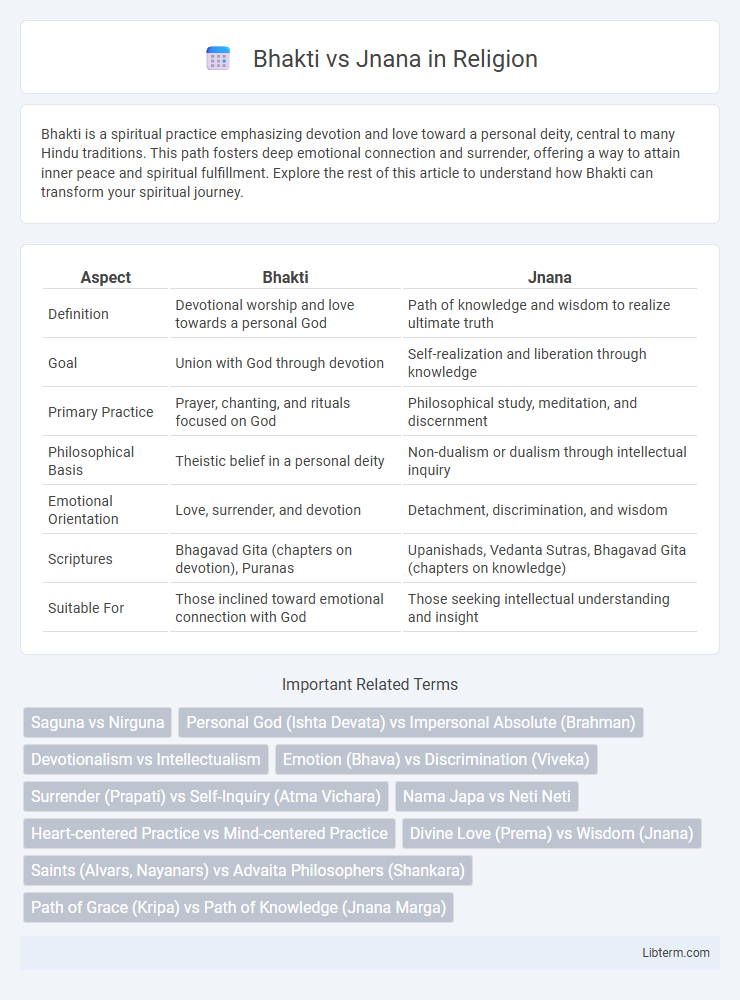Bhakti is a spiritual practice emphasizing devotion and love toward a personal deity, central to many Hindu traditions. This path fosters deep emotional connection and surrender, offering a way to attain inner peace and spiritual fulfillment. Explore the rest of this article to understand how Bhakti can transform your spiritual journey.
Table of Comparison
| Aspect | Bhakti | Jnana |
|---|---|---|
| Definition | Devotional worship and love towards a personal God | Path of knowledge and wisdom to realize ultimate truth |
| Goal | Union with God through devotion | Self-realization and liberation through knowledge |
| Primary Practice | Prayer, chanting, and rituals focused on God | Philosophical study, meditation, and discernment |
| Philosophical Basis | Theistic belief in a personal deity | Non-dualism or dualism through intellectual inquiry |
| Emotional Orientation | Love, surrender, and devotion | Detachment, discrimination, and wisdom |
| Scriptures | Bhagavad Gita (chapters on devotion), Puranas | Upanishads, Vedanta Sutras, Bhagavad Gita (chapters on knowledge) |
| Suitable For | Those inclined toward emotional connection with God | Those seeking intellectual understanding and insight |
Introduction to Bhakti and Jnana
Bhakti is a devotional path centered on deep love and surrender to a personal deity, emphasizing emotional connection and worship practices. Jnana, on the other hand, is a philosophical approach focusing on self-inquiry and knowledge to realize the true nature of the self and ultimate reality. Both Bhakti and Jnana are prominent paths in Hindu spirituality, offering distinct methods to attain spiritual liberation (moksha).
Defining Bhakti: The Path of Devotion
Bhakti, the path of devotion, centers on intense love and surrender to a personal deity, fostering a deep emotional connection that transcends intellectual understanding. It emphasizes heartfelt worship, ritual practices, and the cultivation of compassion, leading to spiritual liberation through grace rather than knowledge alone. This path contrasts with Jnana yoga, which pursues enlightenment through self-inquiry and discernment, highlighting devotion as a means to experience the divine presence intimately.
Understanding Jnana: The Path of Knowledge
Jnana, the path of knowledge in Hindu philosophy, emphasizes self-inquiry and realization of the ultimate truth through discernment and wisdom. This path involves studying sacred texts, practicing meditation, and cultivating discriminative intellect (viveka) to distinguish the eternal self (Atman) from the transient material world. The goal of Jnana yoga is to attain liberation (moksha) by overcoming ignorance (avidya) and realizing unity with Brahman, the supreme reality.
Historical Roots and Philosophical Origins
Bhakti and Jnana, rooted in ancient Indian philosophy, originate from the Vedic traditions and Upanishads, where Bhakti emphasizes devotional love and personal connection to a deity, while Jnana centers on knowledge and self-realization through intellectual discernment. The Bhagavad Gita synthesizes these paths, presenting Bhakti as the path of devotion and Jnana as the path of wisdom, both leading to moksha, or liberation. Historically, Bhakti gained momentum during the medieval period through poet-saints like Ramanuja and Mirabai, contrasting with the Jnana tradition promoted by philosophers like Adi Shankaracharya, who emphasized non-dualistic knowledge.
Core Practices in Bhakti Yoga
Core practices in Bhakti Yoga center on devotion and surrender to a personal deity through rituals like chanting, prayer, and worship (puja). The repetition of mantras and singing of bhajans generate emotional connection and devotion (bhava), fostering a deep inner transformation. Bhakti emphasizes cultivating love, humility, and self-surrender as pathways to union with the Divine, contrasting with Jnana Yoga's focus on intellectual inquiry and self-realization.
Key Disciplines in Jnana Yoga
Jnana Yoga emphasizes key disciplines such as self-inquiry (Atma Vichara), discrimination between the real and unreal (Viveka), and detachment from the transient world (Vairagya). Practices include deep meditation (Dhyana) and study of sacred texts (Svadhyaya) to cultivate wisdom and realize the true self (Atman). Mastery of these disciplines leads to liberation (Moksha) through knowledge (Jnana) rather than devotion (Bhakti).
Major Texts and Teachings
Bhakti, emphasized in texts like the Bhagavad Gita and the Bhakti Sutras, centers on devotion and loving surrender to a personal deity, fostering emotional connection and personal relationship with God. Jnana, explored extensively in the Upanishads and Advaita Vedanta philosophy, advocates for self-realization and knowledge of the ultimate reality, emphasizing discrimination between the eternal and the transient. Both paths offer distinct methods for spiritual liberation, with Bhakti focusing on heartfelt devotion and Jnana on intellectual inquiry and wisdom.
Comparative Analysis: Bhakti vs Jnana
Bhakti emphasizes devotion and emotional connection to a personal deity, promoting surrender and love as the path to spiritual liberation, whereas Jnana focuses on knowledge, self-inquiry, and discernment to realize the ultimate truth through intellect and meditation. Bhakti cultivates a heart-centered experience often found in theistic traditions like Vaishnavism, while Jnana aligns with Advaita Vedanta's nondual philosophy seeking self-realization beyond emotional attachments. Both paths aim for moksha but differ in methods, with Bhakti using faith and worship and Jnana prioritizing wisdom and cognitive insight.
Integrating Bhakti and Jnana in Daily Life
Integrating Bhakti and Jnana in daily life involves balancing heartfelt devotion with intellectual understanding, allowing individuals to experience spiritual growth through both emotional connection and wisdom. Practicing Bhakti fosters compassion and surrender, while Jnana encourages self-inquiry and discernment, together creating a holistic approach to spirituality. This synthesis promotes inner harmony, where faith and knowledge support each other, enhancing mindfulness and purposeful living.
Conclusion: Choosing Your Spiritual Path
Bhakti emphasizes devotion and emotional surrender to a personal deity, fostering a path of love and heartfelt connection, while Jnana centers on intellectual inquiry and self-realization through knowledge and wisdom. Each path suits different temperaments: Bhakti appeals to those seeking emotional intimacy in spirituality, whereas Jnana attracts individuals driven by philosophical understanding and introspection. Choosing your spiritual path depends on aligning with the approach that resonates most deeply with your inner disposition and spiritual goals.
Bhakti Infographic

 libterm.com
libterm.com